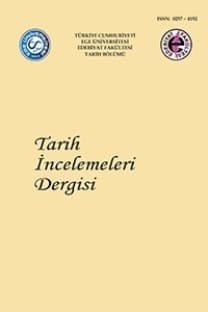Eritre ve Etiyopya Arasındaki Danakil Bölgesinde Osmanlı Hâkimiyeti ve Kaymakam Pertev Efendi
Günümüzde Eritre ve Etiyopya arasında kalan Danakil bölgesi, 19. yüzyılın ikinci yarısından itibaren Osmanlı Devleti’nin Kızıldeniz çevresinde hâkimiyetini korumaya çalıştığı yerlerden biri olmuştur. Bölgede birçok kabile yaşamasına rağmen sahil kesiminde yaşayan kabilelerin ekseriyetle Müslüman olmaları ve Habeşlilerin Kızıldeniz’de bir limana sahip olmak istemeleri devrin Osmanlı makamlarını tedirgin ettiğinden, bu bölge üzerinde yoğun bir rekabet yaşanmıştır. Osmanlı Devleti, Musavva’daki kaymakamlarından ve zaman zaman Yemen’deki görevlilerinden aldığı destekle bölge üzerindeki hâkimiyetini muhafaza etmeye çalışmıştır. Bölgede gerek kabileler arasındaki rekabet ve çatışmalar gerek Fransa ve İngiltere gibi devletlerin müdahaleleri gerekse de din merkezli sürtüşmeler durumu daha da hassas bir hale getirmiştir. Araştırmayla büyük devletlerarasında devam eden rekabetle birlikte, Osmanlı Devleti’nin bölgede tutunma girişimleri ve bu kapsamda yürütülen çalışmalar incelemeye dâhil edilmiştir. Araştırma, günümüzde Türkiye’den çok uzakta olan bu bölgelerdeki mirasın biraz daha gün yüzüne çıkmasını ve görünür hale gelmesini amaçlamaktadır.
The Danakil Region between Eritrea and Ethiopia in the Ottoman Authority in 19th Century and Kaimakam Pertev Efendi
At the present time, the Danakil Region, between Eritrea and Ethiopia, is one of the places that the Ottoman Empire has tried to preserve their authority around the Red Sea since the second half of 19th century. Although a lot of tribes had lived in this region, the Ottoman Empire had worried due to the tribe usually consist of Muslim in the coast and the Ethiopians’ request. And this had led to fierce competition. The Ottoman Empire had tried to preserve their authority with the Governors in Musavva and the support of servants in Hijaz and Yemen. In this region, either the competition and the conflicts between te tribes, or the responses of governments such as France and England, or the frictions had shown up was responsible for a tribe in this region, rejected the proposal of French. With the ongoing competition between the major governments in the region, the Ottoman’s attempts to remain in the region and the working conducted in this context had been incorporated into analyze. Nowadays, this research aims the coming of Ottoman’s legacy to the light and becoming apparent that legacy in these regions, too far away from Turkey
___
- A.M. 26/40
A.MKT.MHM. 204/35
A.MKT.MVL. 48/7
A.MKT.UM. 435/60; 435/73; 450/44; 547/44; 557/65
DH.SAİD. 17/269
HR.MKT. 38/50; 346/41
İ.HR. 182/10092
İ.MTZ (05) 19/739
İ.MVL. 427/18725; 467/21134
MVL. 761/97
Y.A.HUS. 209/15; 266/150
Y.EE. 118/46; 129/45; 129/83; 130/32
Y.PRK.UM. 11/9; 13/47; 14/47
